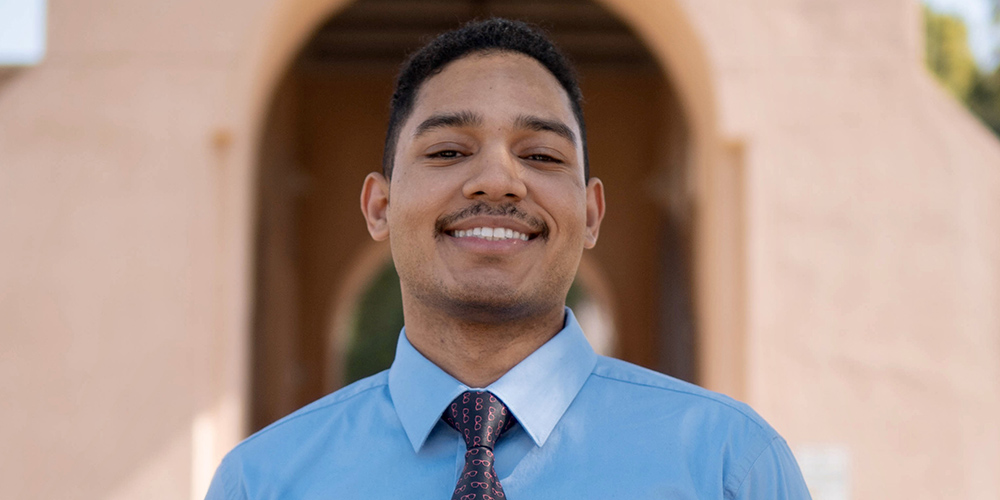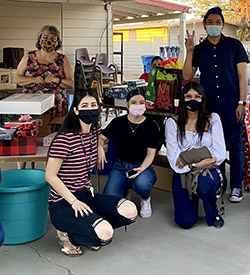
(Photos courtesy of Lawson Hardrick)
California Forward is committed to advancing policy intersections that create a more inclusive and sustainable California where all people can prosper. To move this forward, we must reimagine a state where we address the racial and geographic inequities that have been exacerbated by a public health and economic crisis, and we must answer the call to dismantle structural racism. The Voices of Shared Prosperity series amplifies the stories of Californians who are committing their time and talent to solutions that embrace equity, environmental sustainability, and economic opportunity.
Lawson Hardrick III is one of the millions of students across the country forced into a fully virtual learning environment as a result of the pandemic. He currently serves as president of the Associated Students of San Diego State University, Imperial Valley (SDSU, IV). As a student leader in his final year, he is acutely aware of the impacts of limited broadband access on underserved communities.
The Imperial Valley campus serves as one of SDSU’s satellite locations and a cornerstone for higher education and advanced training in the region. Hardrick is double majoring in psychology and public administration. He credits his school with providing great opportunities for personal and professional growth but he admits that the lack of resources at the university level directly impacts the surrounding community’s growth opportunities.
“This satellite campus wasn’t so easily able to offer four-year programs […] right now we offer about 11 majors which pales in comparison to the number of majors you can have if you were a student in San Diego [State’s main campus],” said Hardrick. He celebrated SDSU-IV’s efforts to increase higher educational attainment in the region, including a community college to state school pipeline, but he emphasized the urgency in expanding their major program offerings.
“When you think about it, if a student is interested in learning about something that they can’t get here, they’re more likely to leave — they’re always more likely to leave,” Hardrick explained. These examples of regional brain drain impact the services a community is able to provide.
For areas like the Imperial Valley that have unincorporated lands and territories, internet access is limited or completely unavailable. This is especially challenging for students. Hardrick describes his educational journey as non-linear but insists that it has been a formidable teacher. He attended community college, worked as a bank teller, and volunteered at his local American Red Cross chapter as a disaster responder before enrolling at SDSU-IV and credits those experiences with developing his ability to be an effective student leader who is well-aware of the needs and tribulations of Imperial County residents.
| Imperial County has 11% lower access to broadband internet than the state as a whole according to the California Dream Index. This includes more than 18,000 people, which is more than the population of the city of Imperial, California. |
|---|
Hardrick is an avid mental health advocate. He emphasizes the importance of connectivity and student access to services, insisting that it is even more important in a post-COVID environment. Hardrick described an embedded curriculum at the university level where students learn to seek resources, build networks and establish themselves as part of a broader community. Students are missing out on the intangible lessons and it threatens student engagement and success.

His position comes as the result of many tough conversations with other students who questioned their ability to complete or return to school. Hardrick is sympathetic to the challenges his peers face in earning a college degree while trying to master the obstacles in their personal lives. “It’s OK not to feel OK but people don’t understand things like that because we don’t talk about things like that,” said Hardrick. He encourages people to seek counseling and advocates for normalizing discussions about mental health and support.
Currently, students in the most vulnerable communities are facing increasing difficulty in accessing resources and building networks, which often degrades a sense of belonging and diminishes expectations for successful outcomes. Hardrick chooses to address these challenges through his policy work. He is also leading a task force composed of local LGBT stakeholders through the county’s only LGBT nonprofit organization. He aims to increase mental health equity in the Imperial Valley for members of LGBT community who have been historically underserved and inappropriately served.
“To me, policy is the intersection between problem and solution. It is the opportunity to do better and create better opportunities for people who have been faced with a wide range of struggles. I get the opportunity to be a part of those solutions,” he added.
Hardrick outlined some recommendations that organizations and individuals can adopt to start bridging the gaps and meeting the needs of students in this space including:
- Improve and equalize representation. Hardrick highlighted some of the differences between support at the satellite campus and main campus. Unfortunately, the satellite campus is under-resourced and there is no mention of Imperial Valley Student Associations in the organizational chart. He is working to remedy this with the University Senate as a voting item to include Imperial Valley students so the university can be included in the network’s shared governance strategy.
- Investment in infrastructure. “We need the infrastructure to train, retain, and employ the types of workers that every community needs to thrive and students need to be involved in that process,” Hardrick said. One of the greatest assets of any community is its next generation of leaders and professionals. So, preparing this group is critically important. He supports holding a referendum or working through the university’s alternative consultation process to fund and engage students in the process securing additional resources.
- Increase awareness about political and legislative processes. “So many people do not understand how the voting process works,” he said. “It can be intimidating at first but the benefits are so great. I would encourage everyone to look for opportunities to get engaged.” Hardrick points to his work with the Associated Students and the California Higher Education Student Summit (CHESS) as key experiences that helped him see the impact of policy work and collective action. He would like to bring campaigns such as “Rock the Vote” that usually occur in San Diego to the Imperial Valley as a means to empower students through voting education.
- Support AB-14. The bill is designed to create infrastructure to improve internet access to Californians who need it most, including underserved urban and rural territories, community anchor institutions, tribal territories and others. “This is the type of legislation we need to help raise our communities up,” said Hardrick. “Internet access is critical in the current fully-virtual environment and it is a 21st century right.”
Hardrick insists that connectivity and continuous efforts to enhance the student experience are directly related to student success. He will continue to use his platforms to increase access and increased opportunities for students and the broader community.
Hardrick is a member of the California Forward Young Leaders Advisory Council and co-authored the Council’s Call to Action: An Intergenerational Approach to a Sustainable Future, which will be released later this month. Hardrick leads on issues related to mental health and equitable access to resources. The Voices of Shared Prosperity stories will be shared in advance of the 2021 California Economic Summit, which will take place on November 9-10.

